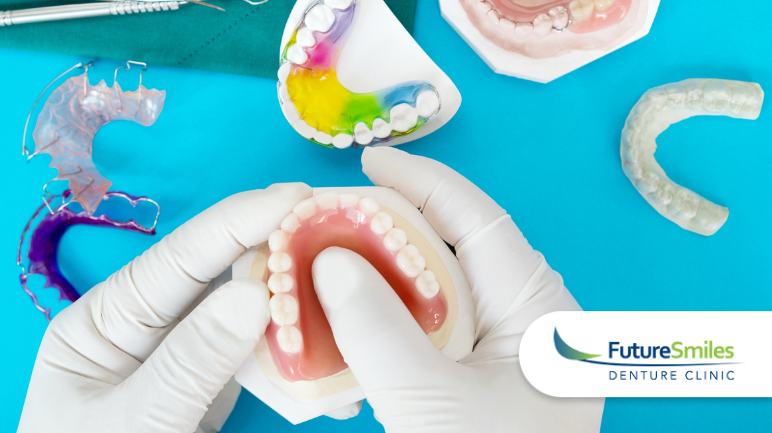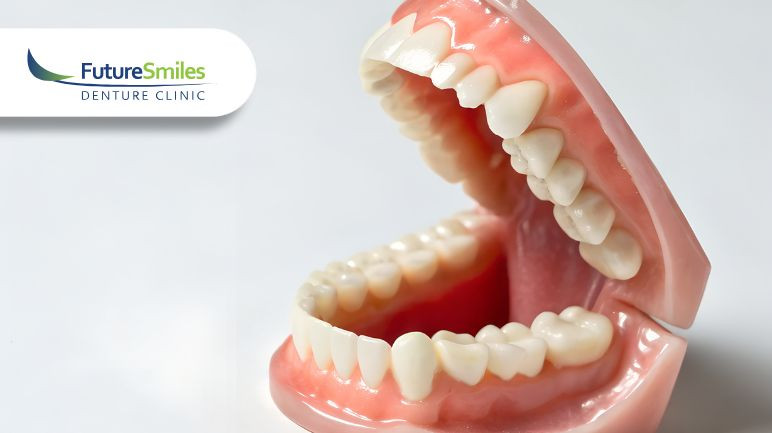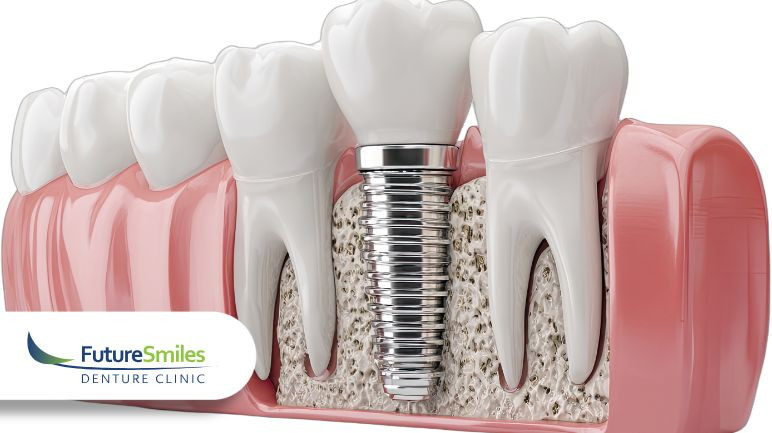Transitioning to complete dentures is a significant change that impacts not just your oral health, but your lifestyle, confidence, and daily routines. At Future Smiles Denture Clinic, we understand the challenges and concerns that come with this adjustment period. Our mission is to support you through every step, offering guidance, care, and the encouragement needed to embrace your new smile confidently. With the right approach, the transition to complete dentures can be a positive and life-enhancing experience. Here, we share essential tips and tricks to help you navigate this journey with ease.
Embrace Your New Smile with Confidence
Adjusting to Eating with Dentures
One of the first hurdles new denture wearers encounter is learning to eat with their new set of teeth. Here are some strategies to make this transition smoother:
- Start with Soft Foods: Begin your denture journey with soft, easy-to-chew foods. Mashed potatoes, soups, and scrambled eggs are excellent choices. Gradually introduce more solid foods as you become comfortable.
- Cut Food into Small Pieces: Smaller pieces are easier to manage and reduce the pressure on your dentures and gums.
- Chew Slowly and Use Both Sides of Your Mouth: This helps to keep your dentures stable and reduces the risk of irritation.
- Avoid Sticky or Hard Foods: Initially, it's wise to avoid foods that require significant chewing force or can stick to your dentures, like caramel or nuts.
Mastering Speech with Dentures
Adjusting to speaking with dentures can take time. Your mouth and tongue need to adapt to the presence of dentures, but with patience and practice, you'll find your speech returning to normal:
- Practice Reading Aloud: Spend time each day reading aloud to yourself. This helps your tongue find the right positions for clear articulation.
- Sing Along to Music: Singing can be a fun and effective way to improve your speech clarity and get comfortable with your dentures.
- Repeat Challenging Words: If certain words are tricky, repeat them several times a day to train your mouth to say them easily.
Maintaining Oral Hygiene and Denture Care
Good oral hygiene is crucial for denture wearers to prevent infections and ensure the longevity of your dentures:
- Clean Your Dentures Daily: Use a soft-bristle brush and a non-abrasive cleaner to gently clean your dentures. Avoid using regular toothpaste as it can scratch the surface.
- Soak Dentures Overnight: Most dentures need to be kept moist to retain their shape. Use a mild denture-soaking solution overnight.
- Don't Neglect Your Gums: Even without natural teeth, it's important to brush your gums, tongue, and the roof of your mouth daily to remove plaque and stimulate circulation.
Emotional Support and Building Confidence
Adjusting to complete dentures isn't just a physical process but an emotional one. It's normal to feel a range of emotions from excitement to frustration. Here are some ways to support yourself during this time:
- Give Yourself Time: Be patient with yourself. It's normal for the adjustment to take several weeks or even months.
- Seek Support: Connect with others who have gone through the transition. Denture support groups, whether in-person or online, can provide valuable advice and encouragement.
- Focus on the Positives: Remember the reasons for choosing dentures, such as the ability to eat a wider range of foods, improved speech, and a confident smile.
At Future Smiles Denture Clinic, we're committed to making your transition to complete dentures as smooth and positive as possible. Remember, adapting to dentures is a journey that requires patience, practice, and the right care routines. By following these tips and tricks, you can confidently navigate this new chapter in your life. Our team is always here to offer support, answer questions, and help you embrace your new smile. Together, we can ensure that your experience is not just about adjusting to dentures, but about rediscovering the joy and confidence that comes with a healthy, beautiful smile.
Written on behalf of Future Smiles Denture Clinic.
FAQs
Q: How long does it typically take to adjust to complete dentures?
A: Adjusting to complete dentures varies from person to person, but most individuals start feeling comfortable with their new dentures within a few weeks to a few months. Patience and consistent practice with eating and speaking are key to a smoother transition.
Q: What foods should I start with after getting complete dentures?
A: Begin with soft, easy-to-chew foods like mashed potatoes, soups, and scrambled eggs. As you become more accustomed to your dentures, you can gradually introduce more solid foods into your diet, cutting them into small, manageable pieces.
Q: What should I do if my dentures feel uncomfortable or cause irritation?
A: If your dentures cause discomfort or irritation, contact your denturist or dentist. They can assess the fit of your dentures and make necessary adjustments to improve comfort. Regular check-ups are also essential to ensure your dentures remain in good condition and continue to fit well.







